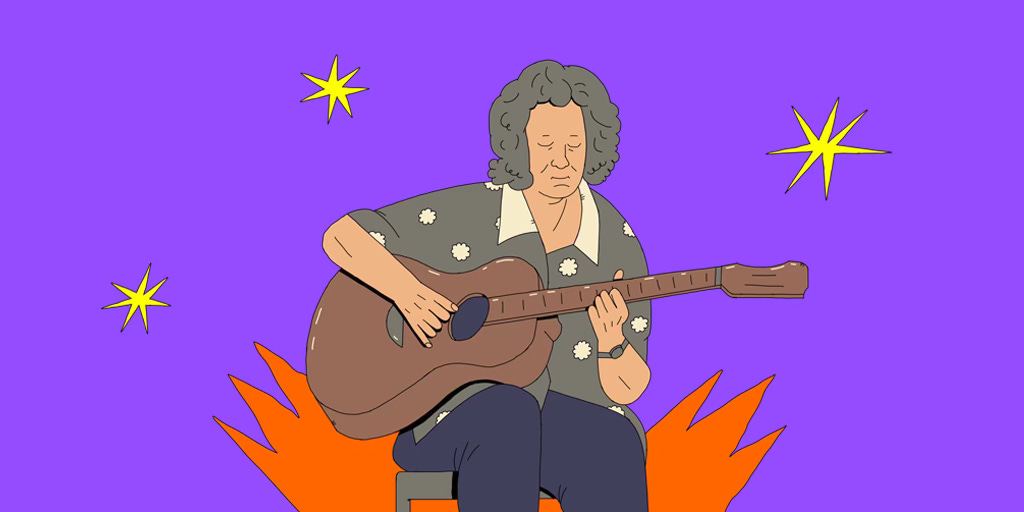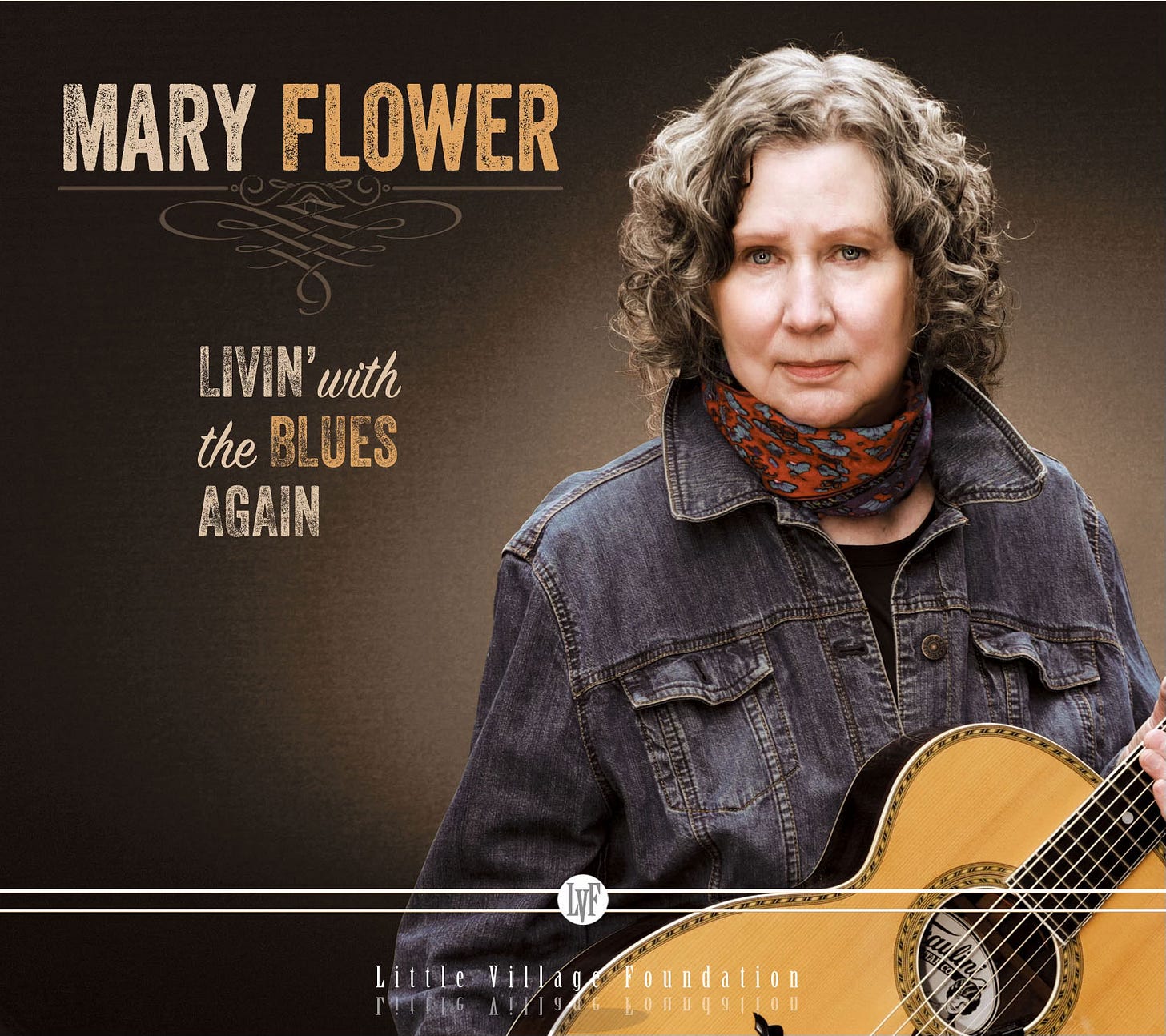“It’s a happy struggle.” — Mary Flower
Most people think passion is about excitement.
The rush of inspiration. The thrill of being in the zone. The feeling that you were meant to do this.
But passion isn’t just about those high moments. It’s also about the struggle—the days when inspiration is nowhere to be found, when the process feels slow, when nothing is clicking.
That struggle, frustrating as it is, is what makes flow — that feeling when everything clicks, time disappears, and you feel like you’re operating at your absolute best — possible.
And few people understand that better than Mary Flower.
A master of fingerstyle guitar, Flower has spent decades perfecting her craft — melding intricate blues, ragtime, and folk into a style that’s unmistakably her own. She’s won national fingerpicking championships, played at some of the most prestigious festivals in the country, and is widely recognized as one of the best in the world at what she does.
Her name has been a constant in my family — my dad has been taking guitar lessons from her on and off since I was a kid, and I’d recognize her riffs anywhere.
But even for someone with her level of mastery, creativity doesn’t always come easy.
The Lull Before the Flow
When we first spoke for this story, Flower was in a creative slump.
“I’m in a rut,” she admitted, almost apologetically, worried she might not sound passionate enough for my interview.
It’s funny how often I hear this from people who have devoted their lives to their craft. The ones who are the most passionate tend to be the hardest on themselves.
I assured her that anyone who has stuck with their craft for their lifetime — without a plan B — is passionate enough. Lulls are part of the deal.
Still, even though the muse showing up, she was playing every day.
“I spend three or four hours a day on music,” she told me.
She was always ready.
“Any time I’m sitting around doing something meaningless like watching TV, I almost always have a guitar in hand,” she added. “Ideas often come to me.”
This is the work before the work — the part that no one talks about. The gathering of bits of inspiration. The experimenting. The searching for clarity and direction.
The people who stick with their passions the longest — like Flower, who has been playing for half a century — know that this isn’t the fun part. But they also know it’s necessary.
Flow doesn’t happen by chance. Passion doesn’t sustain itself. Both come from showing up, putting in the work, and trusting that the spark will return.
And then, for Flower, it did.
The Spark that Lit the Fire
The next time we spoke, she sounded completely different.
A few days before, Flower found out she would be a guest at a special concert this summer. It lit a fire — suddenly, the muse reappeared.
“I told myself, ‘I better buck up,’” she says, laughing. “I wanted to do the best I can. So I went home that night — and viola — I’ve been working on it for three days.”
And just like that, flow arrived.
The Puzzle of Flow
“It’s exhilarating,” she says. “You start out with a puzzle and things start falling into place.”
I know exactly what she means.
I’ve felt it wrestling with an article, when I can’t quite make the ideas fit. I’ve felt it in jiu-jitsu, when a technique doesn’t click — until suddenly, it does. I’ve felt it in research, when a pattern starts to emerge after hours of analysis.
Flow isn’t just the high of the breakthrough — it’s what happens when you wrestle with the puzzle long enough for the pieces to finally fit.
For three days, Flower was lost in it. She barely moved from her guitar.
She tried an open tuning she’d never used before — it worked.
“Then I couldn’t stop. You know when you get so focused, when you’re having such a good time? I just couldn’t stop.”
She played the song over and over.
“I’ve probably played this thing 120 times by now or more. And each time, I do a little editing, and it gets better and better, I think.”
The Struggle that Makes it Worth it
But before that breakthrough? Before the flow? It was hard.
The writer that can’t find the next sentence. The athlete who can’t nail the move. The musician who can’t get the melody right.
Passion doesn’t mean easy.
It can last months, years even. Flower says she spent most of the pandemic in a creative rut. She never stopped playing, but writing? Nothing was coming.
“The struggle has never stopped me before,” Flower says. “I just keep kind of plowing through until it all fits together. It’s a happy struggle.”
I ask her: “You love music that much?”
She doesn’t even hesitate.
“Yes.”
And that’s just it.
The breakthrough — the song, the flow, the effortless moment — is just the cherry on top. But the struggle? That’s what makes it mean something.
Because if it was always easy, would passion feel as powerful? If flow didn’t take work, would it feel like magic?
Flower doesn’t just love playing or teaching music. She loves the process—the messy, frustrating, beautiful happy struggle that makes flow possible.
That’s passion.
Takeaways
Here’s one big thing I learned this week about passion, one exercise you can try to help reignite your own interests, and one aspect of Mary Flower’s enthusiasm that completely changed how I see the world.
One Lesson: Inspiration Is an Archive, Not a Lightning Bolt
Most people think inspiration strikes like lightning — a sudden moment of genius. But Flower’s process shows that creativity rarely works that way. Instead of waiting for the perfect idea, she’s always collecting — recording riffs, saving fragments, trusting something valuable will emerge later.
The takeaway? Build an archive of inspiration. Jot down notes, record voice memos, save ideas—even if they seem useless at the time. Because creativity isn’t just about what happens in the moment. It’s about what you return to.
One Exercise: Embrace the Struggle That Leads to Flow
Flower doesn’t just love playing music—she loves the process. Even when she’s in a creative slump, she picks up her guitar every day, trusting that the breakthrough will come.
This week, try this: Pick something you care about but have been feeling stuck on. Instead of waiting to feel motivated, do it anyway—but with no pressure to be good. Write a messy first draft, play a song badly, practice a move in your sport even if it’s not clicking. Flow doesn’t just happen; it’s earned. Keep showing up, and trust that the spark will return.
One Curiosity: What Makes a Guitarist Truly Stand Out?
Part of becoming a master of your craft is becoming pickier — Flower told me that she loves intricate, expressive guitar playing—but basic strumming? Not so much.
“If I go see someone play and they’re just strumming three chords, I can’t sit through it,” she told me. “Anyone can do that. What interests me is when the guitar is an instrument on its own — not just background noise.”
This made me wonder: What makes a guitarist truly stand out? I’m not a musician, so I did some digging, and it turns out there are dozens of guitar styles: from fingerstyle (Flower’s specialty), to flatpicking, slide guitar, percussive guitar, and more. Now I can’t help but listen differently.
Links
Full Interview Transcript
Become a paid subscriber to access the full transcript of my conversation with Mary Flower below!
Keep reading with a 7-day free trial
Subscribe to On Fire to keep reading this post and get 7 days of free access to the full post archives.







